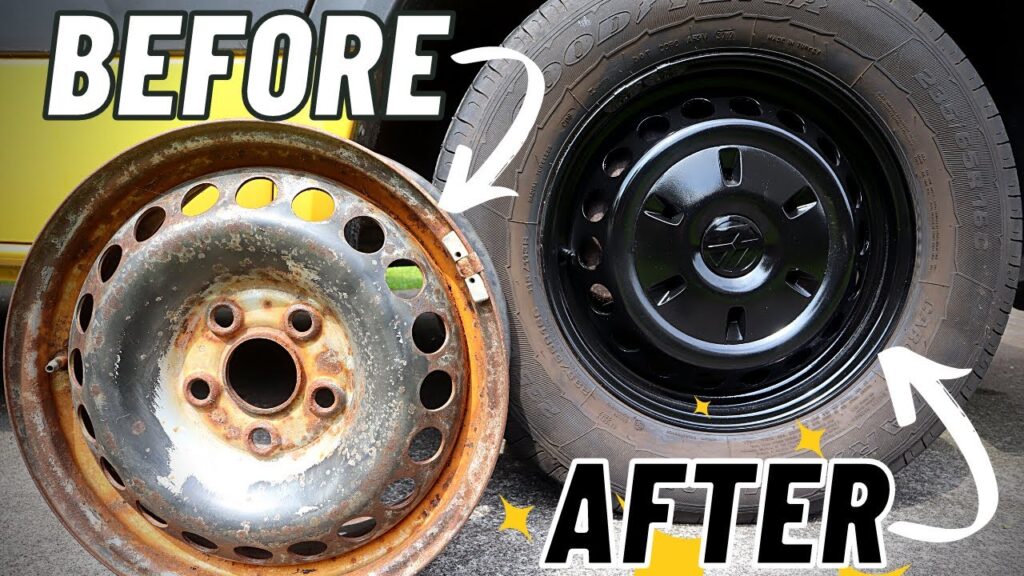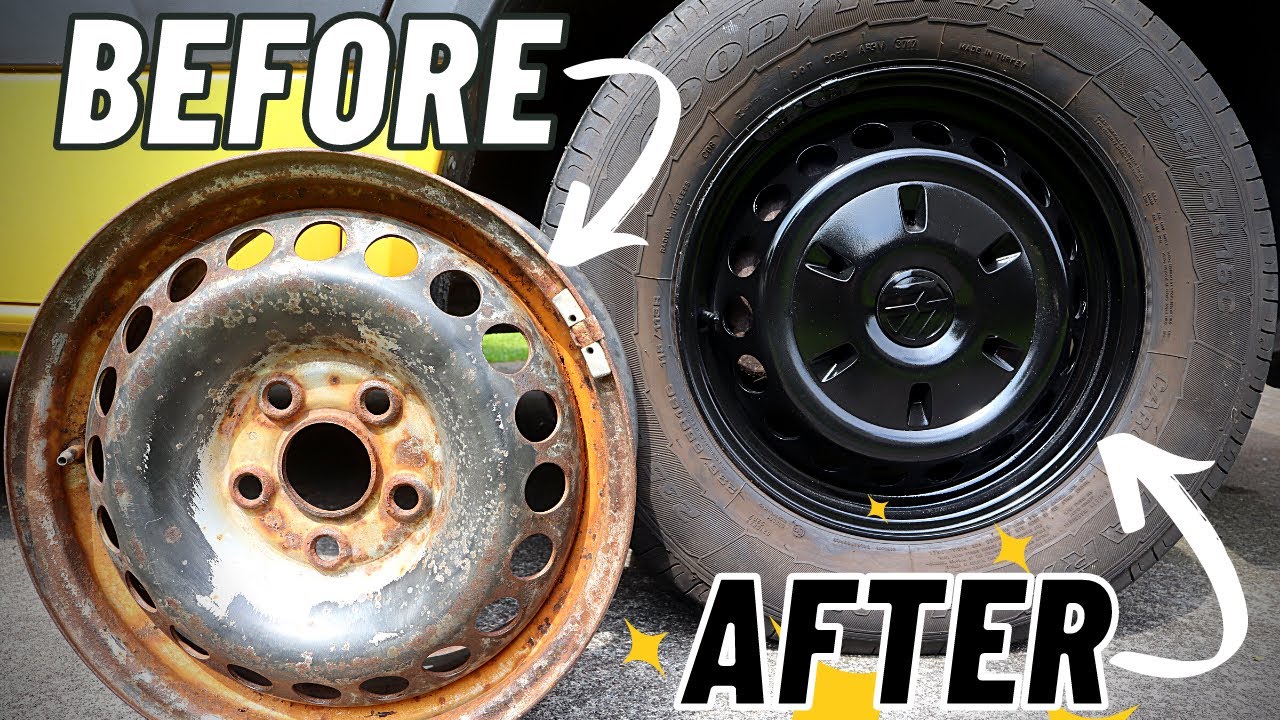
Rusted Wheels: Understanding the Causes, Dangers, and Prevention
Rusted wheels are a common sight on vehicles, especially in regions with harsh weather conditions or where road salts are frequently used. While seemingly a cosmetic issue, rust on your wheels can lead to serious safety concerns and costly repairs. This article delves into the causes of rusted wheels, the potential dangers they pose, and effective prevention strategies to keep your vehicle running smoothly and safely.
What Causes Wheels to Rust?
Rust, scientifically known as iron oxide, is the result of a chemical reaction between iron, oxygen, and moisture. Wheels, typically made of steel or aluminum alloys containing iron, are susceptible to this process. Several factors contribute to the formation of rust on wheels:
- Exposure to Moisture: Rain, snow, and humidity are primary catalysts for rust. Water provides the necessary medium for the oxidation process to occur.
- Road Salt and De-icing Agents: In colder climates, road salt (sodium chloride) and other de-icing agents are used extensively to melt ice and snow. These chemicals accelerate the rusting process by increasing the conductivity of water, allowing electrons to flow more freely and speeding up oxidation.
- Scratches and Chips: Any damage to the wheel’s protective coating, such as paint or clear coat, exposes the underlying metal to the elements. Even minor scratches from curbs or road debris can initiate rust formation.
- Brake Dust: Brake pads generate dust containing metallic particles. This dust can adhere to the wheel surface and, when combined with moisture, can contribute to corrosion.
- Neglect: Infrequent cleaning and maintenance allow contaminants to accumulate on the wheel surface, increasing the likelihood of rust formation.
The Dangers of Rusted Wheels
Ignoring rusted wheels can have serious consequences, affecting both the vehicle’s performance and the safety of its occupants. Here are some of the key dangers associated with rusted wheels:
- Reduced Structural Integrity: Rust weakens the metal of the wheel, compromising its structural integrity. This can lead to cracks, bends, or even complete wheel failure, especially under stress from potholes or rough roads.
- Tire Leaks: Rust on the wheel’s bead seat (the area where the tire seals against the wheel) can create an uneven surface, causing air leaks. This can result in underinflated tires, which affect handling, fuel efficiency, and tire wear.
- Vibration and Imbalance: Uneven rust accumulation can throw the wheel out of balance, leading to vibrations while driving. This can not only be uncomfortable but also accelerate wear on suspension components and tires.
- Brake System Issues: Rusted wheels can indirectly affect the brake system. Rust particles can contaminate brake components, reducing their effectiveness and potentially leading to brake failure.
- Aesthetic Degradation: While not a safety concern, rust significantly detracts from the vehicle’s appearance and can lower its resale value. Ignoring rusted wheels can give the impression of poor maintenance, impacting potential buyers.
Preventing Rust on Wheels: Proactive Measures
The best way to deal with rusted wheels is to prevent rust from forming in the first place. Here are several proactive measures you can take to protect your wheels:
- Regular Cleaning: Wash your wheels regularly, especially after driving in wet or salty conditions. Use a mild soap and water solution and a soft brush to remove dirt, brake dust, and road salt.
- Protective Coatings: Apply a wheel sealant or wax to create a protective barrier against moisture and contaminants. These products help to repel water and prevent rust from adhering to the wheel surface. Reapply sealant or wax every few months for optimal protection.
- Touch-Up Paint: Promptly repair any scratches or chips in the wheel’s paint or clear coat. Use touch-up paint specifically designed for automotive wheels to prevent rust from forming in these areas.
- Winter Wheel Sets: Consider using a separate set of wheels for winter driving. Steel wheels are a more affordable option than alloy wheels and are better suited to withstand the harsh conditions of winter roads. [See also: Best Winter Tires for Your Vehicle]
- Wheel Covers: Wheel covers can provide an additional layer of protection against road salt and debris. Choose wheel covers that fit snugly and are made of durable materials.
- Avoid Harsh Chemicals: When cleaning your wheels, avoid using harsh chemicals or abrasive cleaners that can damage the finish. These products can strip away protective coatings and make the wheels more susceptible to rust.
- Proper Storage: If you store your wheels during the off-season, clean them thoroughly and apply a protective coating before storing them in a dry, well-ventilated area.
Dealing with Existing Rusted Wheels
If your wheels already have rust, it’s important to address the issue promptly to prevent further damage. The approach depends on the severity of the rust.
Minor Surface Rust
For minor surface rust, you can often remove it yourself using the following steps:
- Clean the Wheel: Thoroughly clean the wheel with soap and water to remove any dirt and debris.
- Sand the Rusted Areas: Use fine-grit sandpaper (e.g., 400-grit) to gently sand the rusted areas. Be careful not to damage the surrounding paint or finish.
- Apply Rust Converter: Apply a rust converter to the sanded areas. Rust converter chemically transforms the rust into a stable, paintable surface.
- Prime and Paint: Once the rust converter has dried, apply a primer specifically designed for metal surfaces. Then, paint the area with a matching wheel paint.
- Apply Clear Coat: Finish with a clear coat to protect the paint and provide a glossy finish.
Severe Rust
For severe rust, where the metal is significantly weakened, DIY repair is not recommended. In such cases, it’s best to consult a professional wheel repair specialist or consider replacing the wheels altogether. Attempting to repair severely rusted wheels yourself can compromise their structural integrity and pose a safety risk.
Professional Wheel Repair and Refinishing
Professional wheel repair services offer a range of solutions for rusted wheels, including:
- Sandblasting: Abrasive blasting removes rust and old paint, preparing the wheel for refinishing.
- Welding: Welding can repair cracks and bends in the wheel structure.
- Powder Coating: Powder coating provides a durable, corrosion-resistant finish that is superior to traditional paint.
- CNC Machining: CNC machining can restore the original shape and finish of the wheel.
While professional repair can be costly, it’s often a more economical and safer option than replacing the wheels, especially for high-end or custom wheels. Always research the reputation and experience of the repair shop before entrusting them with your wheels.
The Importance of Regular Inspection
Regularly inspecting your wheels for signs of rust is crucial for maintaining their safety and longevity. Look for:
- Visible Rust Spots: Even small rust spots can indicate a larger problem beneath the surface.
- Bubbling Paint: Bubbling paint is a sign that rust is forming underneath the paint layer.
- Cracks or Bends: Cracks or bends in the wheel structure can be caused by rust or impact damage.
- Air Leaks: Check your tire pressure regularly. Unexplained air loss can indicate a leak caused by rust on the wheel’s bead seat.
If you notice any of these signs, take action promptly to address the issue before it escalates. Early detection and intervention can save you time, money, and potential safety risks.
Conclusion
Rusted wheels are a preventable problem that can have serious consequences if left unaddressed. By understanding the causes of rust, recognizing the potential dangers, and implementing proactive prevention strategies, you can protect your wheels and ensure the safety and performance of your vehicle. Regular cleaning, protective coatings, and prompt repair of any damage are essential for keeping your wheels in top condition. Remember, a well-maintained set of wheels not only enhances the appearance of your vehicle but also contributes to its overall safety and reliability. Don’t neglect your wheels – they’re a vital component of your vehicle’s performance and your safety on the road. Addressing rusted wheels promptly is a smart investment in the long-term health of your vehicle. Keep those wheels turning safely!

